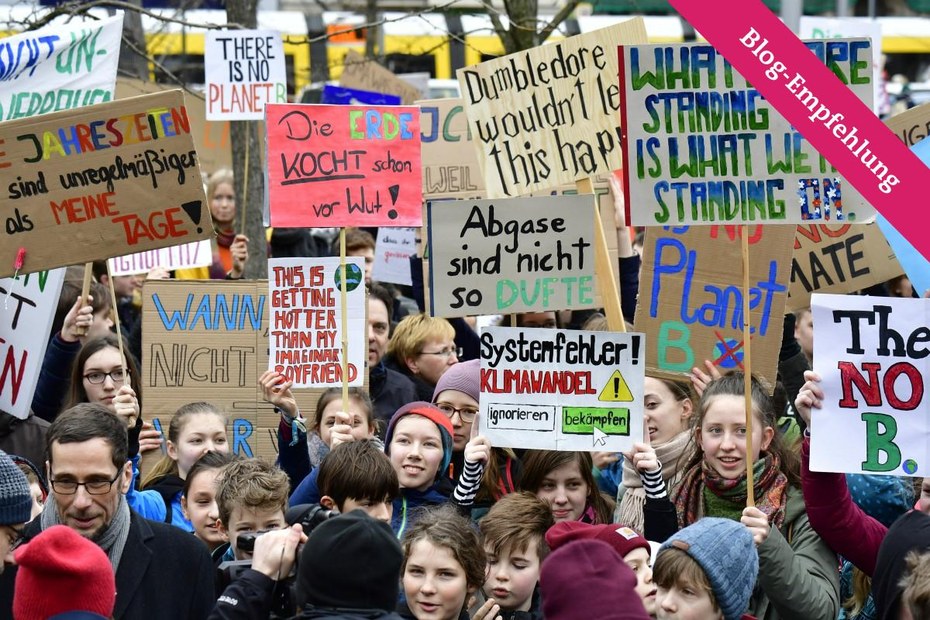Climate change is certainly one of the greatest challenges mankind has ever faced. And it has already begun. Humanity has known this for decades – and yet has done hardly anything about it. Which, of course, does not make the situation any better. To underline its seriousness, descriptions and scenarios are increasingly being used to illustrate the drama of the situation. There is talk of a climate catastrophe or even an apocalypse. Or also of a climate war. Yet this terminology is perfectly suited to proclaiming for the sake of overcoming this crisis a state of emergency and demanding, for example, an extremely controlling war economy that regulates and rations all consumption from holiday flights to daily meals.
However, these military-apocalyptic concepts raise the question of what is really gained by them? Will they really lead to a rethink in the western industrialized world, as long as the war catastrophe in their case consists first and foremost of plenty of good weather? Yes, we must face the facts of climate change and its consequences relentlessly and we must react to them. And yes, climate change is already leading to numerous international conflicts. German sociologist Harald Welzer has already coined the term "climate wars" ten years ago. And yet an all too catastrophic scenario runs the risk of paralysing the positive sense of possibility and instead being misused above all to implement painful measures at the expense of the weak, i.e. to bring about the supposedly green turn without social compensation.
Most of the measures proposed so far involve this danger, from CO2 pricing and electric mobility to meat taxes. If everything becomes more expensive, i.e. gets more realistic prices and is therefore consumed less, this may be good for the climate. But if we simply keep to the higher prices, climate protection will be at the expense of the poorer. There is little help in ten or twenty percent cheaper train tickets or in electric cars if I, as a commuter in the rural area, just painstakingly paid off my Diesel. And if I also have to worry about losing my job in the coal industry, the prospect of 'doing without for the climate' might not exactly inspire me.
New deal or no deal
A solution is promised here by concepts of a "Green New Deal" – as long as they combine green investments with a departure from the growth paradigm and thus a new concept of prosperity that is no longer understood only in material terms and oriented solely to the steady growth of GDP. This is the case, for example, in the draft "Green New Deal for Europe" (GNDE), a joint initiative of the pan-European party DiEM25, the New Economics Foundation and other organisations. Like the numerous "Green New Deal" proposals in the wake of the economic and financial crisis since 2008, as well as the current push of some US Democrats, the GNDE is also in line with the original "New Deal" of Franklin D. Roosevelt from the 1930s, first and foremost an economic stimulus program, green Keynesianism so to speak, financed by central bank money. But one of the "ten pillars" of the GNDE is also "an end to the dogma of endless growth". The indicator of prosperity and progress should no longer be the constantly rising GDP, but rather the focus should be on goals such as "equality, environment, satisfaction and health".
Thus this programme is even closer to John Maynard Keynes, one of the patron saints of all "New Deal" policies, than the measures of an anticyclical, expansive fiscal policy commonly associated with his name already suggest. As early as 1930, however, Keynes developed a vision of a future in which people would simply enjoy the enormous prosperity that had been achieved by society, instead of continuing to grow through constant work performance. For the year 2030, Keynes envisioned an average working week of about 15 hours, which should be enough to enable everyone to live a good life. Keynes' vision of growing societal prosperity turned out to be extremely accurate. Only of the likewise increasing social inequality and the apparent consumer needs of today did he have a less precise idea.
The Democracy in Europe Movement 2025, or DiEM25, which entered the EU elections with its far-reaching democratization agenda for Europe, including a "Green New Deal", failed with its leading candidate Yanis Varouvakis to make it into the EU Parliament. The "Green Deal" for the EU recently announced by the coming Commission President Ursula von der Leyen shows how this concept will now be adopted by the other political side. For it is not just an arbitrary linguistic variation that the "new" is dropped under the table here. Thus the originally intended shuffling and (re-)distributing of the cards – in the sense of Roosevelt's "New Deal" – remains ultimately only a shabby entrepreneurial "deal" like no other than Donald Trump boasts of successfully making it the basis of his politics. But in this way prosperity and work for all are being sacrificed to the fashionable topic of climate protection instead of being reconciled with it. (Thankfully Naomi Klein has conceptually righted this wrong by proposing „the art of the green new deal“ in her latest book On fire.)
Under the given circumstances, there is a danger that the climate question will become a new class struggle, both along the old economic line of conflict between capital and labour, and along the new cultural line between cosmopolitans and communitarians. No wonder that the right-wing national "communitarians" of the German AfD are less interested in climate protection in the brown coal regions, for example, than at least in pretending to offer their supporters fearing the exit from coal a prospect for the future. Nor is it a miracle after decades of propagating no other concept of prosperity than a purely consumerist one, that those who are allergic to restrictions are those who cannot simply substitute their little consumption with cosmopolitan-cultural capital.
Yellow vests and Fridays for Future
An instructive example of a blurring of this old and new line of conflict was recently given by Wolfgang Uchatius in a dossier in the German weekly Die Zeit. He compares today's world problem of climate change with the old world problem of slavery and writes: "Today slavery is abolished. [...] There is still forced labour in the world, workers are still slogging away in some places for a few coins a day. The exploitation of man still exists, but it has declined sharply. What has increased is the exploitation of the earth." That is true, but unfortunately a somewhat too simple juxtaposition. For basically, both forms of exploitation have always been – and still are – closely linked. The fact that the (North-)Western world, which is supposedly such a role model in human rights matters, has meanwhile shifted the largest and – in several respects – dirtiest parts of its industrial production to the global South(-East) only obscures the situation for us.
Uchatius' proposed solution is correspondingly simple: "prohibit" and "raise prices", because "nature also needs social laws". But he does not say how important it is to simultaneously prevent these social laws for nature from being primarily at the expense of those for whom social laws were originally created. Uchatius is absolutely right when he sees a "strength of the weak" in the political rather than in the private: "it does not manifest itself in renunciation, but on the street, the streets only have to be full enough." He is only a little careless in the identification of the weak. Because these are not so much the young, urban "Fridays for Future" demonstrators, whose parents - like the environmentally aware Zeit-author himself - often no longer even own a family car, which they could dispense with, but have to force the politicians to forbid them their holiday flights. Rather it is the people who cannot afford a holiday at all. For example, those in France, who couldn‘t just go on strike to express their dissatisfaction with politics, and who have instead one year ago put on their yellow warning vests on Saturdays to make it clear that they are not prepared to accept climate protection at the price of social justice.
They, too, have achieved a lot. But social progress on this issue will only really reach its goal when yellow vests and Fridays for Future demonstrators take to the streets together at some point to stand up for alternatives to a system in which prosperity is measured solely by economic growth and in which "the people" do not simply exploit nature. But in which a few, very few people exploit very many, i.e. almost all other people AND exploit nature in order to enrich themselves on their backs through artificially created "needs" for consumption. For alternatives, and I mean real alternatives, we all, cosmopolitans and communitarians alike, have to flood the streets and squares together. For the actually relevant question is how this mental revolution can succeed, without the coming about of (further) war-like conditions and the further social disruptions and aggravations that go along with them.
This article was originally published in German.






Was ist Ihre Meinung?
Kommentare einblendenDiskutieren Sie mit.